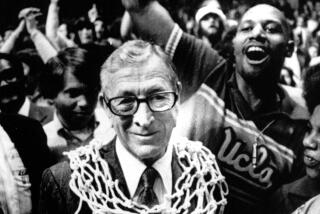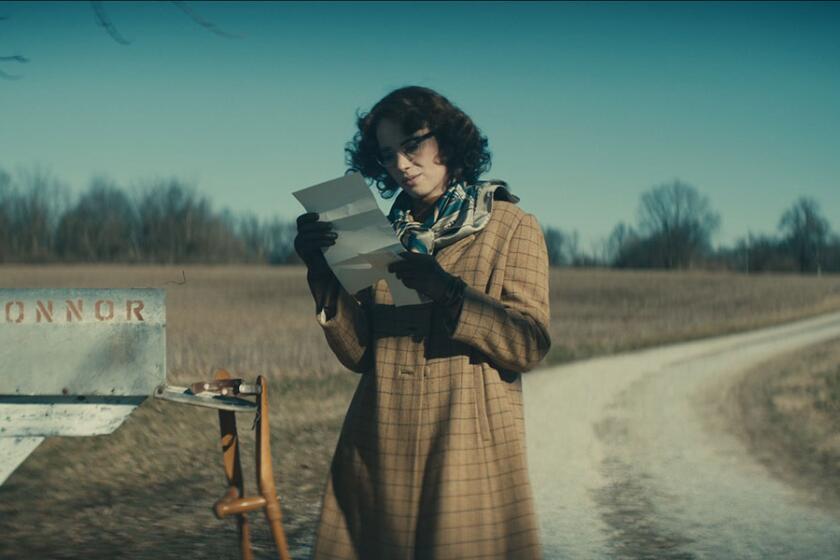In ‘Requiem for the Big East,’ the wrong kind of March Madness
NEW YORK — Any college basketball fan worth their bracket fee will recall the many glorious years of the Big East, from the colorful ‘80’s teams of John Thompson and Lou Carnesecca to, in recent years, the highly competitive games between the likes of Louisville and UConn.
They’ll also remember the inglorious end to what was once the strongest conference in the nation: desertions by Syracuse and Pitt to the ACC and the splintering of UConn and Louisville into the new AAC, all leading to the decimation of the once-proud league.
That rise and fall — and the unavoidable role of TV money in both — is chronicled by Ezra Edelman in “Requiem for the Big East,” a new documentary in ESPN’s 30 for 30 series that airs on the network Sunday night after this year’s tournament selections are announced. With a glint of nostalgia and a tear for the present state of affairs, Edelman documents how a small group of Northeast colleges revolutionized college basketball, and how that very success led to the league’s implosion.
BEST MOVIES OF 2013: Turan | Sharkey | Olsen
“I really wasn’t interested in taking a walk down memory lane,” Edelman said in an interview Friday. “I was interested in telling a story that got at these larger issues of the corporatization of college sports.”
With that aim in mind, Edelman crafted a tale that, though sport-specific and timely, also speaks to global truths about the intersection of sports and money. While those of us watching care about teams pretty much no matter what, “Requiem for the Big East” shows the costs and calculations among those who benefit from our affection.
For casual or forgetful fans, a quick refresher. In the late 1970s, a group of small universities overlooked by the college-basketball establishment came together to form the Big East, a former Providence College athletic director named Dave Gavitt leading the mission to put on the hoops map a number of private, mostly urban Northeast schools, including St. John’s, Georgetown and Villanova.
As the league gained success and national attention — a peak perhaps achieved at the 1985 NCAA tournament, in which the Big East boasted three teams in the Final Four — so did the schools’ ambitions. Soon they had formed their own network, and by the 1990s, expansion had kicked in, as West Virginia, Miami and other schools farther afield had joined the conference, with hope of football glory firmly in tow.
PHOTOS: Celebrities by The Times
But, as “Requiem” recalls, with those appetites came risk. As the league ranks swelled and collegiate TV deals grew ever-more profitable (a development kickstarted, ironically, by the rise of the Big East itself), Big East schools, particularly those that also played the far more lucrative sport of football, were tempted by invitations from other leagues. Last year, the roof finally caved in.
“The theme of this film is what do you do when you create an enterprise and it’s successful, and then you get bigger and you lose the thing that made it special in the first place,” said Edelman. “It’s a fundamental American story: You try to create more success and you try to hold on, but it’s not really possible to do both.”
Now based in New York, Edelman, 39, grew up in Washington, D.C., as a Georgetown fan. He acknowledges that some of his perspective is colored by nostalgia for the Patrick Ewing-led teams of his youth and its rivalries with the likes of Syracuse and St. John’s. (Full disclosure: this reporter shares that fondness.)
Indeed, “Requiem” revels in scenes such as Georgetown’s John Thompson famously mimicking the sweater choice of St. John’s Carnesecca, or landmark games involving Rollie Massimino’s Villanova and Jim Boeheim’s Syracuse. Many of those personalities are interviewed and as vibrant as ever, including Boeheim, who comes off as surprisingly warm and serene; from the ranks of vintage Big East coaches, only Seton Hall’s P.J. Carlesimo is absent.
But no matter that nostalgia, the veteran Edelman — he worked at HBO for years and produced the recent critical darling “Cutie and the Boxer” — says he believes that what’s lost is real and significant.
PHOTOS: Box office top 10 of 2013 | Biggest flops of 2013
“I don’t want to go so far as to say that the sport is dead, and there’s still something that’s exciting about the NCAA tournament,” he said. “But the thing that connected me to it is gone. Something has been fundamentally broken.”
Not lost as a culprit in all this is ESPN itself. Founded the same year as the Big East, the pair’s fates were bound together, the rise of one aiding the fortunes of the other. (The network was among the first to show Big East games, for example.) The billion-dollar business that fractured the Big East became that way in part because of ESPN.
Edelman’s film doesn’t shy away from ESPN’s role, though he is not its harshest critic either. In the interview, he said that he was “wary” whether he’d have the freedom to depict the company’s role while it was financing and airing his film, but that he was given autonomy to tell the story as he saw fit.
There is hope that the charm of the original Big East can be resurrected by some of the new upstart teams — see under: rivalries between emerging forces such as VCU and St. Louis in the A10, the ascendancy of Wichita State in the Missouri Valley or even the emergence of Saturday’s finalist Creighton in the reconstituted Big East. It could be a tough road: The primacy of money, the phenomenon of many college players decamping early for the pros and the generally elevated financial stakes would seem to inhibit that. As one journalist who covered the Big East in its heyday lamented in the film, “They ran out all the poets and made them all salesmen.”
But the more level-headed thought comes, fittingly, from an eminence gris of the old conference itself. “Things don’t stay the same,” Carnesecca says in the movie. “Change is always difficult.”
ALSO:
In ‘Price of Gold,’ recalling the far-off era of Tonya Harding
Tribeca: New York Knicks doc, featuring Phil Jackson, to premiere
Will ‘Need for Speed’ make the surge in racing films backfire?
Follow me on Twitter at https://twitter.com/ZeitchikLAT
More to Read
Only good movies
Get the Indie Focus newsletter, Mark Olsen's weekly guide to the world of cinema.
You may occasionally receive promotional content from the Los Angeles Times.







